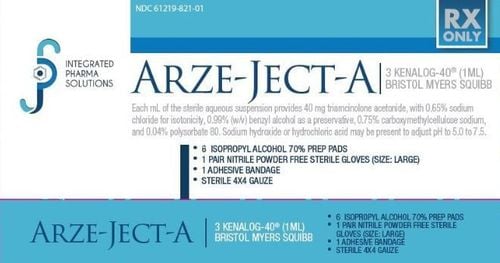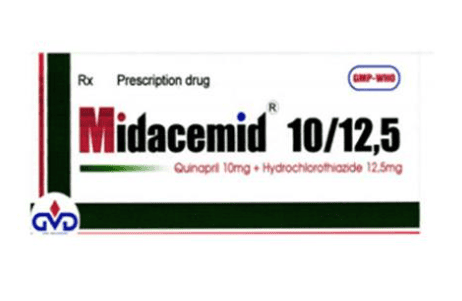This is an automatically translated article.
Cardicare 10 is a medicine used to treat high blood pressure. The following article will introduce readers to more specific information and uses of Cardicare 10.
1. What is Cardicare 10?
The main ingredient of Cardicare 10 is Enalapril maleate 10mg. Excipients: Lactose anhydrous, magnesium stearate, maleic acid, yellow iron oxide.Cardicare 10 is made in the form of round, light yellow tablets.
Packing of Cardicare 10: box of 3 blisters x 10 tablets.
Cardicare 10 is a product of OPV pharmaceutical company - Vietnam
2. Effects and indications of Cardicare 10
Pharmacodynamics of Enalapril: Enalapril is an angiotensin-converting enzyme inhibitor, thanks to enalaprilat being a metabolite of enalapril after oral administration. Enalapril is effective in lowering blood pressure in people with normal blood pressure or with hypertension. The drug mainly inhibits the renin-angiotensin-aldosterone system, so it has a good effect on hemodynamics in people with congestive heart failure. Enalapril inhibits angiotensin converting enzyme (ACE) leading to blocking angiotensin I => angiotensin II (a vasoconstrictor). Enalapril causes a decrease in sodium retention, an increase in the kallikrein-kinin vasodilator system, and may alter prostanoid metabolism and sympathetic nervous system depression due to a decrease in serum aldosterone. Enalapril inhibits the breakdown of bradykinin because angiotensin-converting enzyme plays an important role in kinin breakdown.
In hypertensive subjects, enalapril reduces total peripheral resistance with a slight increase/no increase in heart rate, systolic output or cardiac output conferring a blood pressure-lowering effect. Enalapril causes dilation of arteries and possibly veins.
In patients with congestive heart failure, Enalapril is often combined with cardiac glycosides and diuretics, reducing total peripheral resistance, pulmonary artery pressure, heart size and mean pressure and right atrial pressure. In diabetics, enalapril has been shown to decrease proteinuria. Enalapril increases insulin sensitivity in hypertensive subjects with or without diabetes.
Enalapril pharmacokinetics: Enalapril is absorbed from the gastrointestinal tract about 60% of the oral dose. Food does not decrease or increase the absorption of the drug.
Peak serum concentrations of enalapril are reached within 0.5 - 1.5 hours.
The half-life of enalapril is about 11 hours.
Enalapril is extensively hydrolyzed in the liver to enalaprilat after absorption into the body. Within 3-4 hours enalaprilat reaches peak serum concentrations.
The antihypertensive effect is evident about 1 hour after taking 1 dose of enalapril, blood pressure decreases maximally in 4-6 hours, usually lasting within 12-24 hours.
Approximately 50 - 60% of the amount of enalapril entering the body is bound to plasma proteins. Approximately 60% of the administered dose is excreted in the urine as enalaprilat and unchanged drug, the remainder of the drug excreted in the feces.
Indications of Cardicare 10:
Treatment of essential hypertension, hypertension due to kidney disease, hypertension with diabetes. Diabetic nephropathy may or may not be hypertensive. Patients with heart failure: reduce mortality, slow progression of heart failure, reduce the number of myocardial infarctions. Treatment and prevention of congestive heart failure. Prevention of ventricular dilatation after myocardial infarction.
3. Dosage and how to use Cardicare 10:
Cardicare 10 is used orally, can be taken before, during or after a meal.
Primary hypertension: The starting dose is 5 mg, the dose can be increased depending on the degree of hypertension, the maintenance dose is determined after 2-4 weeks of treatment. Daily maintenance dose for patients: 10-40 mg orally per day, administered once or divided into two times. Maximum dose 40 mg/day. Cardicare 10 should be started from a low dose because it can cause symptoms of hypotension. Do not use Cardicare 10 at the same time with diuretics. In patients with renal impairment: Creatinine clearance 30 - 80 ml/min: oral dose of 5 - 10 mg/day. Creatinine clearance 10-30 ml/min: oral dose 2.5-5 mg/day. In case of heart failure: Cardicare 10 is often combined with digitalis and diuretics (should reduce the dose of diuretics and take them away from the time of taking Enalapril). A starting dose of 2.5 mg, which can be gradually increased to a therapeutic dose, must be carefully monitored during this process. There is no evidence to prove the safety and effectiveness of the drug in children, so it should not be used in children.
4. Contraindications of Cardicare:
People with hypersensitivity to enalapril or any other ingredient of the drug. Patients with a history of angioedema caused by ACE inhibitors, idiopathic or hereditary angioedema. People with renal artery stenosis (on both sides of the kidney) or in people with only one kidney. Patients with cystic obstructive cardiomyopathy and aortic stenosis. Pre-existing hypotension.
5. Undesirable effects when using Cardicare 10
Common (ADR >1/100): Dizziness, headache, fatigue, insomnia, paresthesia, taste disturbance, nausea, vomiting and abdominal pain, diarrhea, angioedema, severe hypotension, orthostatic hypotension, palpitations, chest pain, syncope. There may be symptoms of rash, dry cough, possibly due to increased tissue kinins or prostaglandins in the lungs. Uncommon (1/1000
6. Drug interactions
There may be a synergistic effect when enalapril is combined with other antihypertensive agents. In patients receiving enalapril and thiazide diuretics, the potassium-depleting effect of thiazides is often attenuated by enalapril. If enalapril is used in combination with a potassium-depleting diuretic, hypokalemia may be improved. Concomitant use of enalapril with lithium may increase serum lithium concentrations leading to lithium toxicity. Concomitant use of enalapril with oral contraceptives poses a risk of difficulty controlling blood pressure. Concomitant use of enalapril with sympathomimetic bronchodilators may reduce the antihypertensive effect of enalapril. Concomitant use of enalapril with beta-adrenergic blocking agents, methydopa, nitrates, calcium channel blockers, hydralazine, prazosin and digoxin has not been associated with clinically significant adverse events. Nonsteroidal anti-inflammatory drugs, including selective cyclooxygenase-2 inhibitors, may reduce the effectiveness of diuretics and other antihypertensive drugs.
7. Notes and cautions when taking Cardicare 10
Symptomatic hypotension may occur. Caution should be exercised in patients with intravascular volume depletion, due to diuretics, dietary salt, dialysis, diarrhea, vomiting, heart failure, myocardial ischemia or cerebrovascular disease. Patients with aortic stenosis, hypertrophic cardiomyopathy. Bilateral or unilateral renal artery stenosis on a single kidney. Major surgery or during anesthesia with antihypertensive drugs. CKD. Breastfeeding women and children. Pregnancy and breast-feeding: Enalapril can cause illness and death to the fetus and newborn when used by pregnant women. Use of the drug during the second and third trimesters of pregnancy can cause diseases leading to miscarriage and neonatal injury, including: hypotension, neonatal cranial hypoplasia, reversible or irreversible renal failure and death. Enalapril should be discontinued as soon as possible after pregnancy is detected. Enalapril is excreted in human milk. With usual therapeutic doses the risk of adverse effects in the breastfed infant is very low. Effects of the drug when driving and operating machinery: May experience dizziness, drowsiness. Care should be taken while taking the drug. Cases of drug overdose and treatment:
Symptoms:
The data on overdose of enalapril in humans is limited. The hallmark of enalapril overdose is severe hypotension.
Management:
When overdose occurs, treatment with enalapril should be discontinued and the patient closely monitored, applying symptomatic and supportive measures such as induction of vomiting, gastric lavage, intravenous plasma infusion. and sodium chloride to maintain blood pressure and treat electrolyte imbalances. Hemodialysis can remove enalapril from the circulation.
Store the medicine at a temperature below 30°C, in a dry place, away from direct light.
Please dial HOTLINE for more information or register for an appointment HERE. Download MyVinmec app to make appointments faster and to manage your bookings easily.













